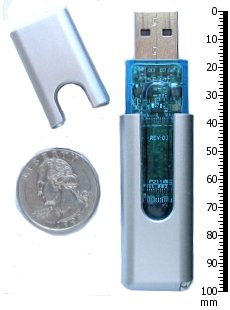2006-09-12
Fun with Portable Software

The latest trend in the computer industry is making a big splash despite its small frame.
Small, portable, USB compatible devices, capable of holding several gigabytes of data, are a viable alternative to compact disk media for file transfers and data storage. The two mediums have combined to crush the archaic floppy disk under the weight of its own 1.44 megabytes.
These thumb-sized vaults of information have found a new and immediately popular niche in their ability, thanks to faster USB technology, to run full program applications at speeds comparable to native hard disk access. This realization has led to an entire industry filled with "portable applications" ? software programs that run completely on removable USB memory drives and make no changes to system settings or files. This development adds new meaning to the words plug and play. When the user is finished, the drive can be unplugged and used in the exact same way on a different computer.
Most of the currently available portable applications are freeware, meaning they can be used free of charge without limitation, and many of them, including portable versions of Mozilla Firefox and Thunderbird, are part of the open source software revolution.
One of the more popular sources of self-named portable software is PortableApps.com. The consistently updates site has the latest portable/standalone versions of Firefox, Thunderbird and a variety of other useful applications including the popular Microsoft Office replacement, Open Office and a fully functional visual FTP client.
A second site that makes the rag cut is The Portable Freeware Collection. This site gets the PRrag seal of approval because its owner not only makes constant updates, but consistently removes software from the database if it contains any form of adware or spyware or makes any changes to your system settings or hard disk.
This is why open source, non commercial, software is working so well and becoming so popular. Before the open source boom, you couldn't download a simple program without facing the consequences of unwanted advertisement software and other computer-slowing, security-compromising junk. In those days, between 2001 and early 2004, unwanted programs ruled the land and were a far greater security risk than any virus or worm at the time.
That was the age of the spyware. The age after the basic death of Netscape and prior to the stable release of Firefox, which was released in September, 2002 under the name "Phoenix."
The PR guy wanted to give portability a try, so I purchased an RiData 2GB USB 2.0 compatable drive. It is a little wider than I was expecting but lightweight and inexpensive.
Using Firefox and Thunderbird along with the rest of the PortableApps Suite, I also gave myself Gimp Portable, a lightweight open source graphic and photo editing solution.
I like it. The only thing I'd worry about is that if this takes off and people start to rely on the portable applications and their password saving features, USB drives will become more valuable than wallets. The lesson here is that you should always protect your data. If you're prone to losing things, do not save your passwords on your portable apps.
Another feature is the convenience of Open Office. This is a full feature productivity suite with most of the bells and whistles you'd see in comparable commercial products, and it's free and open source means anyone with the ability can take its code and turn it into whatever their heart desired.
Thus, the age of spyware closed and the age of open source, transparent, software has emerged. The only question that remains is, what comes next?

